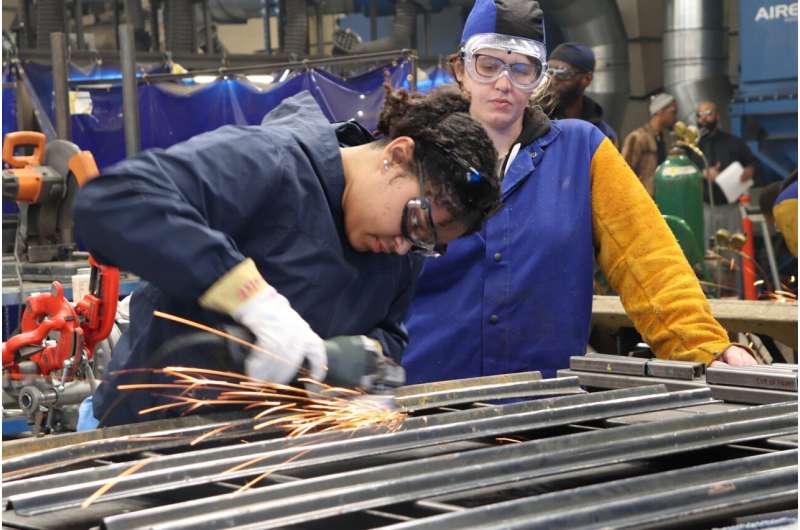This article has been reviewed according to Science X's editorial process and policies. Editors have highlighted the following attributes while ensuring the content's credibility:
fact-checked
trusted source
proofread
Study finds that on-the-job training can lead to higher employee satisfaction

The value of on-the-job training should not be underestimated, according to a University of Auckland study, which found that overeducated and over-skilled employees are less likely to quit if training is available.
The study, detailed in the paper "Educational job mismatch, job satisfaction, on-the-job training, and employee quit behaviour: A dynamic analytical approach," is the first to test the impact of on-the-job training and job satisfaction among job-mismatched employees.
The researchers found that overeducation alone, or accompanied by skill underutilization, in combination with lower job satisfaction, increases incidences of job quitting. However, on-the-job training decreases the likelihood of overeducated, overskilled workers quitting, says study co-author and professor of economics Sholeh Maani.
Another key finding is that overeducated and overskilled employees may stay with their present employers if they otherwise have high overall job satisfaction.
Overeducation is prevalent across economies, and statistics from OECD countries classify 35.7% of the workforce in qualification-mismatched jobs, says Dr. Maani, who has been working on a series of papers in the areas of lifetime economic returns to education, and educational mismatch, in particular, overeducation and overskilling.
"There's a relatively high percentage of people in both New Zealand and Australia who are in jobs where their credentials and years of education are above what is required, and this is why we're undertaking research in this area."
Maani and co-authors, Business School academics Le Wen and Zhi Dong, found that overeducated and overskilled workers have about a 12% greater likelihood of obtaining on-the-job training than workers whose qualification and experience matched their role.
"We examined the career trajectories of employees in mismatched jobs and provide new evidence that on-the-job training contributes significantly to their retention. Specifically, the analysis provides additional understanding of how on-the-job training can be utilized to reduce recruitment and training costs," she says.
The results show that on-the-job training among employees who are in mismatched positions (overeducation and skill underutilization) leads to greater retention, and this helps to explain why job mismatches may no longer be predominantly temporary for some workers, says Professor Maani.
"You may not expect that when someone's overeducated and overskilled that getting on-the-job training would put them on a path to more job satisfaction and reduce their likelihood of quitting, but we found that for those who had on-the-job training, it changed their trajectory, and in connection with job satisfaction, they were less likely to resign, and stayed longer at their jobs."
Job mismatch is an issue of international concern, says the economist, who utilized Australian data for the study.
"Australia has a system in which the prevalence of government financial support for training, industry standards requirements and established training providers facilitates on-the-job training. As such, this study provides other countries with evidence for policy considerations from the Australian case in which on-the-job training receives widespread support and uptake."
More information: Le Wen et al, Educational job mismatch, job satisfaction, on-the-job training, and employee quit behaviour: A dynamic analytical approach (2023).
Provided by University of Auckland





















